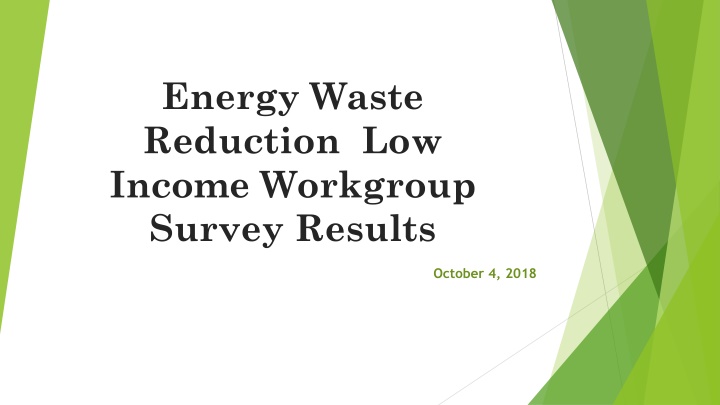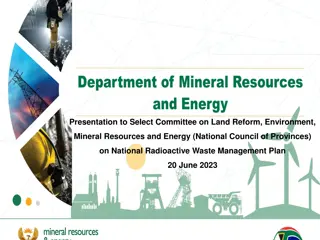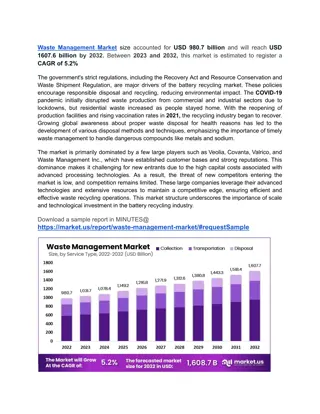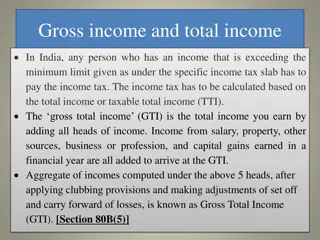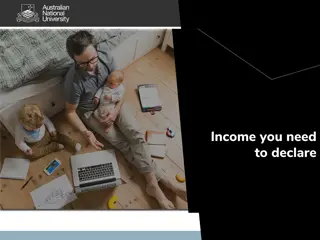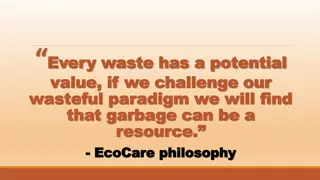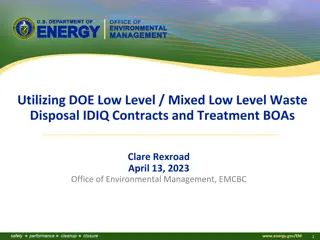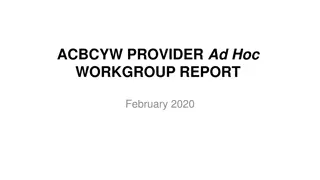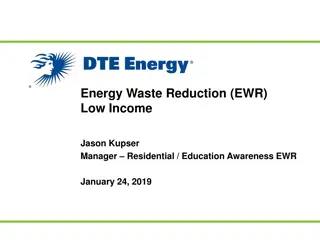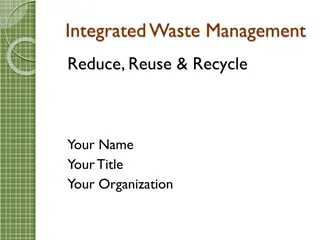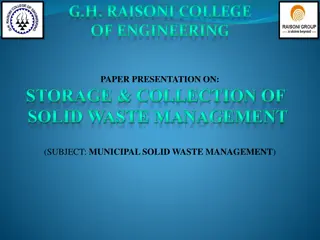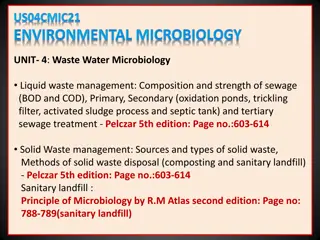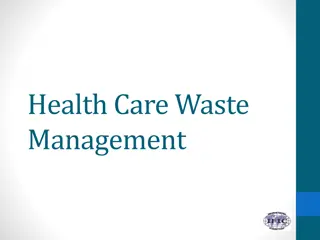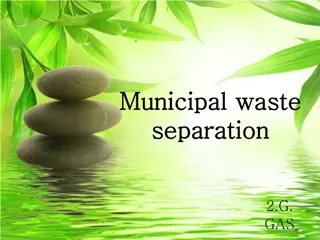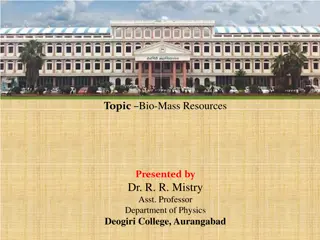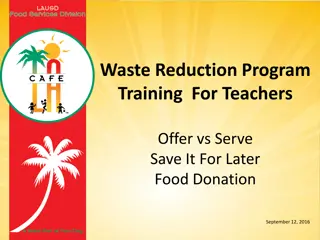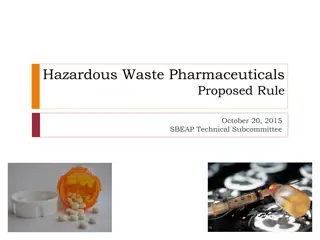Energy Waste Reduction Low-Income Workgroup Survey Results & Activities
This document presents the results and activities of the Energy Waste Reduction Low-Income Workgroup, showcasing survey participation, major themes, and additional groups recommended for involvement in addressing energy efficiency, equity, and affordability issues.
Download Presentation

Please find below an Image/Link to download the presentation.
The content on the website is provided AS IS for your information and personal use only. It may not be sold, licensed, or shared on other websites without obtaining consent from the author.If you encounter any issues during the download, it is possible that the publisher has removed the file from their server.
You are allowed to download the files provided on this website for personal or commercial use, subject to the condition that they are used lawfully. All files are the property of their respective owners.
The content on the website is provided AS IS for your information and personal use only. It may not be sold, licensed, or shared on other websites without obtaining consent from the author.
E N D
Presentation Transcript
Energy Waste Reduction Low Income Workgroup Survey Results October 4, 2018
Summary of Workgroup Activities April - Launch Work Group; identify mission and relevant topics May - Prioritize topics June - First two prioritized topics: Multifamily + Coordination across gas, electric, and water utilities (launch of Multifamily breakout) July - Third prioritized topic: Outreach and Engagement (launch of Outreach and Engagement breakout ) September - Fourth prioritized topic: coordination of EWR, Weatherization, bill assistance, and other programs (launch of Coordination of EWR, Wx, bill assistance and other programs breakout pending) October - Fifth prioritized topic: Health, safety, and walk-away issues November - Sixth prioritized topic: Program funding levels and funding sources (+ financing) December - Seventh/last prioritized topic: Deep dive into poverty and energy affordability metrics
Survey Results: Participation 61 responses from 49 organizations Including Community action agencies Utilities Implementers Environmental/Energy Orgs Housing Orgs State Agencies (MPSC, MDHHS, MAE) University of MI Clean Energy Financing Community Groups And more
Why is this work group of interest to you/ What can this group help to address? Major themes from the responses: *Networking and forming partnerships *Collaboration Equity Innovation for how to best design, implement, expand LI EWR programs Helpful for preserving and improving affordable housing Streamlining services Reducing energy burden and risk of shut-offs Financing Addressing the needs of low-income individuals Removing Barriers Addressing Gaps
What additional groups need to be at the table? Environmental Justice, Racial Justice, and low-income advocates UP and rural residents Municipal energy & sustainability leaders. Faith community Direct service workers (intake and case managers, energy auditors, weatherizers) Affordable Housing Owners and Associations Low-income customers, including renters Legislative representation. Cooperatives and munis Coalition to Keep MI Warm Note involve certain stakeholders for certain topics
Suggestions for meeting locations outside of the MPSC/Lansing? *Ann Arbor University of MI *Grand Rapids ICCF *Detroit EcoWorks Cass Commons Wayne Metro *Flint *UP *Happy with Lansing MPSC MSU Holland/Holland Energy Park, Kalamazoo Northwest MI Battle Creek Gaylord Mount Pleasant At a utility space DTE Consumers SEMCO United Ways across MI Cities with high poverty levels * 2+ votes
What additional topics would you most like to see this work group address in the future? Future Suggestions Energy Literacy/Education Renewable Energy (and coordinating RE with EWR) Resource Guide Non-energy benefits Innovative program approaches Developing common data collection and reporting practices / Data collection and sharing generally Water Efficiency/Affordability (as it relates to energy) Clean Energy Workforce Development Our Current Priorities Program Funding Levels Coordination Between Gas, Electric, and Water Utilities Outreach and Engagement Coordination between EWR, Weatherization , and Assistance Programs Measuring and Tracking Affordability
Work Group Vision and Mission Work Group Vision: All Michigan residents live in efficient, affordable, safe, and healthy homes. Work Group Mission: To coordinate and optimize energy efficiency and clean energy offerings, to improve energy affordability and quality of life for Michigan s low- income residents, and to improve program design, accessibility, and delivery. We do this through: (1) Collaborating and coordinating to identify and address barriers and needs that negatively affect energy efficiency efforts; (2) Sharing best practices and other relevant information among utility providers, government agencies, and other stakeholders; (3) Ensuring that the needs of impacted communities are heard and addressed; (4) Developing tangible deliverables needed to achieve prioritized outcomes and overcome identified barriers; (5) Prioritizing and recommending action.
Work Group Vision and Mission Response Suggestions: More emphasis on active inclusion of affected communities in discussions and decision-making regarding energy policy and programs. Language should speak to active coordination rather than just sharing of best practices
Meeting Structure Feedback Most of you like the meeting structure! Concern about capacity and resources to get all interested parties to the table Concern that we re trying to do too much at once, fewer more focused deliverables suggested Desire for less frequent meetings to help sub groups do work on the off months. Attendees like the room set-up (small tables), a nice change from the usual board room feeling space Attendees like the presentations, but some would like to see them trimmed down/more focused Attendees like brainstorming and small group activities, but need to remain focused and concrete Difficult to follow via conference call - GoToMeeting or other webex based meeting could help
Steering Committee Proposal: Steering Committee to be created to help guide this work Tasks to be shared among members might include helping to set agendas, facilitate meetings, identify action items, and track progress toward goals About 20% of the survey participants were interested in participating Feedback from everyone included: Committee should include membership from a diverse set of groups/sectors Group should be small 5-10 people
Proposed Compromise: Meet every other month in person with calls or breakout group calls in- between
Proposed Meeting Schedule after December January: Steering Committee Meeting February: Full Group In-Person Meeting March: Steering Committee Meeting & Breakout Calls April: Full Group In-Person Meeting May: Steering Committee Meeting & Breakout Calls June: Full Group In-Person Meeting July: Steering Committee Meeting & Breakout Calls August: Break September: Full Group In-Person Meeting Etc.
Q&A Questions?
